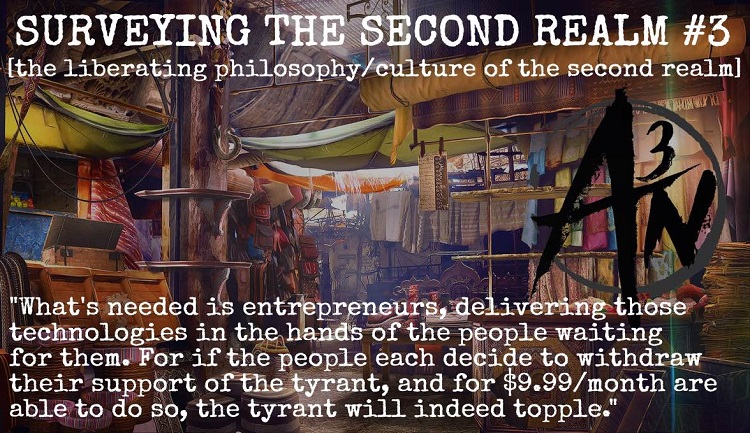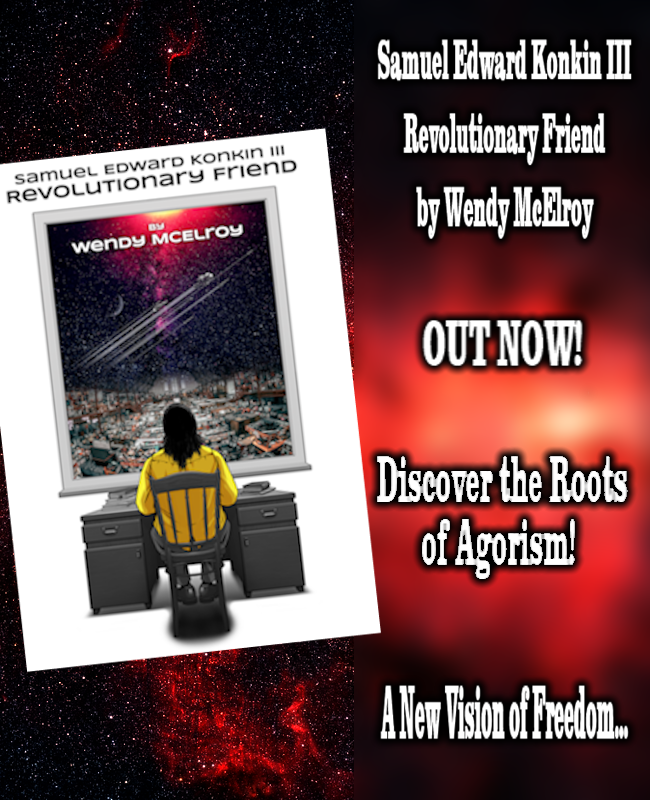
[SURVEYING THE SECOND REALM #3] – THE LIBERATING PHILOSOPHY/CULTURE OF THE SECOND REALM
[The following is the third article in my ongoing article series for Agorist Nexus, Surveying The Second Realm. Find #2 here.]
At the foundation, the Second Realm is a cypherpunk/crypto-anarchist strategy; that is, the use of technology (like bitcoin, encryption, and decentralized networks) to remove attribution from action, providing radical freedom to individuals. But while this strategy is “high tech” in nature, equal emphasis is placed on building physical Second Realms, versus focusing purely on the digital – this is why I became so interested in it a few years back myself. Like freedom festivals provide short-term, these Realms:
…give us the opportunity for our culture to exist in physical space, allowing us to conduct our business, organize our social relationships, and to handle conflicts in the way we think to be right. [Second Realm: Book on Strategy]
It is the literal re-building of all necessary (voluntary) aspects of society, as well as the merging of what I have found to be the most efficacious freedom strategies over the years – agorism, temporary/permanent autonomous zones theory (henceforth referred to as TAZ/PAZ, respectively), crypto-anarchy, and just security culture applied, again, in the most radical way.
Foundational Principles
The philosophical, moral, and ethical underpinnings of the Second Realm overlap with that of voluntaryism, as well as ancient and Biblical principles (think the Golden Rule, Natural Law, etc. – who would have known, even our ancient ancestors knew not to be assholes and not to defraud).
These two principles are autonomy and peace. Autonomy overlaps with the voluntaryistic notion of self-ownership (that you own yourself and the fruits of your labor), and the expression for peace refers to the commitment to property rights. After all, clearly delineated property rights (and contracts in general) can eliminate disputes before they ever arise, minimizing conflict. With this understanding, both moral and utilitarian justifications can be found, especially when considering that the servile society operates peacefully the majority of the time anyway (hell, most of the “disturbances of peace” are from bludgies/bureaucrats that won’t leave someone alone).
The importance of self-defense and dispute/conflict resolution become more apparent – the peace of the Second Realm relies upon the defense and enforcement of said property rights, since the building of this alternative society means reliance upon First Realm court systems is not possible. Another method is one of prevention, trading strategies that minimize the need for resolution in the first place (will be covered later).
To conclude the philosophy portion, Smuggler and XYZ appropriately write: “One cannot be fully human without also being in liberty.”
Mobility/Semi-Permanence
Whether we’re talking about Rayo or Smuggler, both recognize and understand the importance of mobility. As I’ve said many times before, if the coercers can’t find you, they can’t coerce you; and if you don’t even know where you’re going to be laying your head next week, there’s no way those nosy bastards at Google or the NSA are going to either. Furthermore, the nature of the servile society is that of volatility – the ability to leave without loss (confiscation of property) is far preferable than picking a fight with Leviathan.
So, as we build Second Realms, the concepts of mobility and of semi-permanence (to provide some lasting stability) are important to keep in mind. Smuggler and the other Berlin cypherpunks have settled on converted shipping containers as the best modern iteration:
- They’re highly mobile; since Smuggler et al are located in a commercial zone amidst hundreds of other containers, they can have themselves and their “homes” relocated in hours.
- They’re ubiquitous, cheap, and discreet.
Shades of Grey
Clearly then, in many ways, it would appear that the First and Second Realm are almost irreparably divided in terms of principles and “standards”-of-living. Therefore, some sort of segregation is necessary, even if only mental. Smuggler and XYZ put it thusly:
The clearest of these is that our physical and digital temporary autonomous zones and any interaction between only Second Realm inhabitants belongs to the Second Realm exclusively, with everything else being in the First Realm.
The primary reason this is so important is that privacy/security culture must be practiced in the First Realm, which are impediments to culture. Segregated Second Realms provide optimal safety and comfort, important precursors to culture, art, and other forms of entertainment/relaxation.
All of that said, we’ve found that the vast majority are in transition between the two Realms (shades of grey, not black-and-white) – cutting ties to the First Realm, building up sustainable, independent side hustles, slowly and comfortably moving towards total liberation (i.e. total immersing in Second Realms, whether TAZs or PAZs). 2020 seems to have expedited this process a bit.
Later on in this series, I’ll discuss the complementary role of the proxy merchant, an individual facilitating interactions between the Realms. This entrepreneur/specialist is of enormous value. It’s a potential way to have your cake and eat it too (i.e. still have access to the First Realm, while living and exercising your autonomy in the Second).
A Flourishing Culture
To pull another quote from Second Realm: Book on Strategy, “culture is a spontaneous order that is shaped by the individuals of a society, reflecting their individual decisions and mentalities.”
In the First Realm, this outward expression tends towards “legal/lawful” activities, taking place in taxed, regulated, & licensed establishments, with consumption of vices being mostly relegated to legally sanctioned, often Big Pharma-approved stimulants/depressants. The most “liberating” cultural manifestation in the First Realm would undoubtedly be a music festival/concert…and those might not be around in 2021. It’s safe to say that the creative and artistic spirit of most individuals in the First Realm is surely crushed.
As I elaborated in Surveying The Second Realm #2, the culture of the First Realm is one primarily of degradation and servility. It is the total antithesis of what’s important in the Second: again, autonomy and peace. Culture helps to weave tighter connections between individuals, as well as creating a group identity of sorts – rituals around a fire, a rave, morning yoga, literally whatever the culture develops into. This recognition of autonomy and the importance of human life/freedom also fosters a culture of building each other up.
As an example, many have recognized this firsthand from attending events like the Midwest Peace and Liberty Fest, Jackalope, or VonuFest – to me, it’s one of the most addicting aspects. There really is something to be said about finding your tribe and spending time with those that you resonate with. Instead of the resistance self-liberators often find in the servile society, this energetic force multiplies.
Conclusion: We’re not leaving the world behind.
Some will see strategies like this and think, “I can’t just leave people behind.” And rightfully so; but, his strategy isn’t one of escapism or abandonment. Rather, it’s a recognition that what is currently ruling over the dystopic First Realm is not sustainable, and is not in the interest of the future of humanity, or even of Earth more generally.
We’re taking the plunge and building the new society, outside of and despite the existence of the First Realm. More specifically, we’re working out the kinks in the coming privacy-centric arbitration systems; we’re building the infrastructure of open source, decentralized tech that will further assist the transition; we’re building up self-sufficient homesteads, which serve as nodes in an overarching network of Second Realms…and so much more.
In the spirit of Etienne de la Boetie, an anonymous Anarplex.net author writes,
The technological part is developed enough. What’s needed is entrepreneurs, delivering those technologies in the hands of the people waiting for them. For if the people each decide to withdraw their support of the tyrant, and for $9.99/month are able to do so, the tyrant will indeed topple.
So, build on, my friends. And make some bitcoin while you do.







